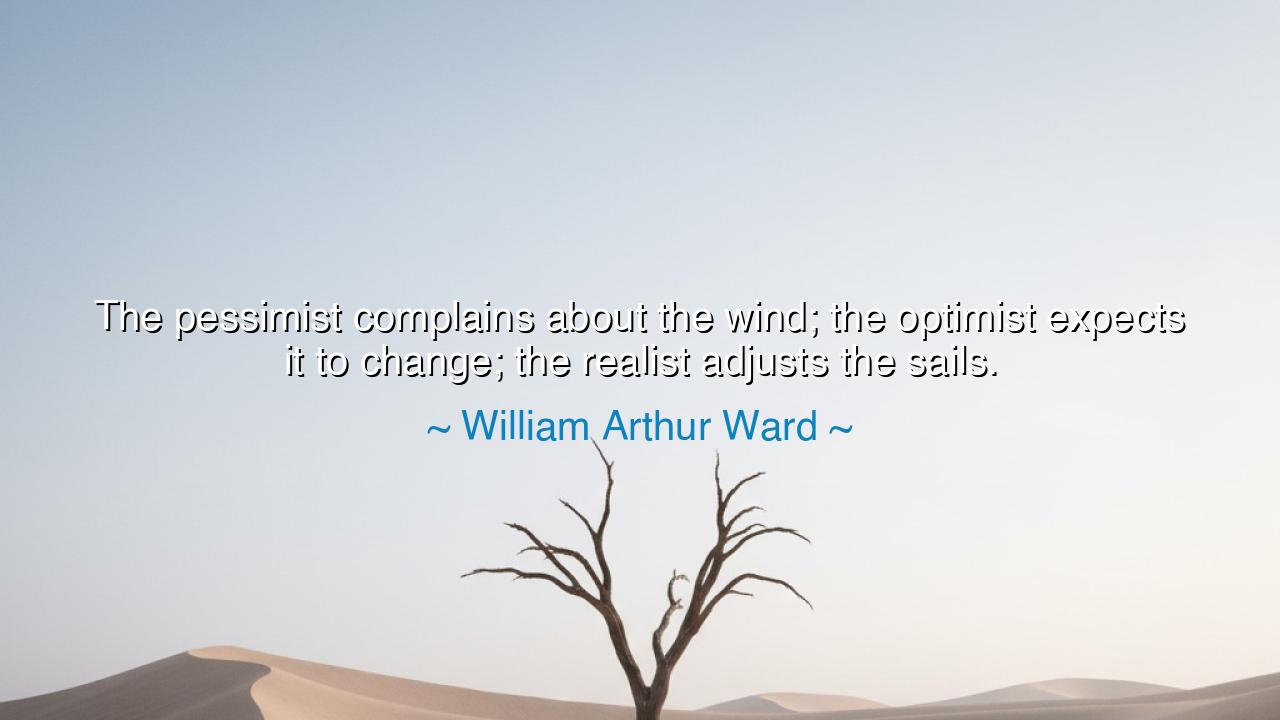
The pessimist complains about the wind; the optimist expects it
The pessimist complains about the wind; the optimist expects it to change; the realist adjusts the sails.






Host: The harbor was caught in that sacred hour between storm and calm. The sky was an enormous canvas of shifting greys — clouds like bruises and the faint blush of dawn trying to push through. The wind came in unpredictable bursts, sharp and restless, tugging at the masts of anchored boats that rocked against their ropes like impatient horses.
Host: Jack stood at the edge of the pier, his coat whipping in the wind, his eyes fixed on the horizon where the light was still undecided. He had the look of a man who’d weathered too many storms — not all of them made of rain. A few feet away, Jeeny sat on a bollard, her hair tangled, her face calm but alive, watching him with that mix of empathy and challenge that only she carried.
Host: Between them, weighed down by a rusted compass, was a small scrap of paper — damp at the edges but legible still. The quote, handwritten in fading ink, belonged to William Arthur Ward:
“The pessimist complains about the wind; the optimist expects it to change; the realist adjusts the sails.”
Host: The wind rose then, as if summoned by the words themselves.
Jack: “You know,” he said, his voice low and steady, “that line could’ve been written by a sailor. Or a survivor.”
Jeeny: “Maybe both,” she said. “Because at sea, optimism doesn’t save you — adjustment does.”
Jack: smirking “Spoken like someone who’s seen enough storms to stop waiting for fair weather.”
Jeeny: “Or someone who’s learned that weather doesn’t apologize,” she said.
Host: The water slapped against the dock — not angry, just insistent. A seagull cried somewhere above, the sound cutting through the wind like a laugh.
Jack: “I’ve been all three,” he said. “The complainer, the dreamer, and the adjuster. The pessimist in me curses the wind. The optimist hopes it’ll turn. But the realist…” he paused, looking at the ropes swaying in rhythm “…the realist knows that no wind’s useless if you know how to use it.”
Jeeny: “That’s the trick, isn’t it?” she said. “To take what’s given — not what’s ideal — and still move forward.”
Jack: “But it’s hard,” he said. “We’ve built a world that worships optimism. It sells better than realism. People would rather buy hope than humility.”
Jeeny: “Because hope feels lighter,” she said. “But realism — realism carries weight. It demands participation. You can’t just wait for the wind; you have to work with it.”
Host: The wind shifted, sudden and sharp, snapping a nearby flag into motion. Its sound was raw, almost human.
Jack: “The pessimist,” he said, “feels betrayed by the world. The optimist, entitled to its kindness. But the realist — the realist accepts its indifference and still builds meaning out of it. That’s not cynicism. That’s courage.”
Jeeny: “Yes,” she said softly. “Courage disguised as adaptation.”
Jack: “You think adjustment’s a virtue?”
Jeeny: “I think it’s the only one that keeps us alive,” she said. “The oak breaks in the storm, but the reed bends and survives. Adjustment isn’t weakness — it’s wisdom in motion.”
Host: The light changed — a fragile gold began to thread its way through the clouds, glinting off the wet ropes, turning the whole harbor into a trembling reflection of resilience.
Jack: “You know,” he said, “I used to think realists were boring. Too practical. No poetry. But now I see — they’re the ones who actually live through the story.”
Jeeny: “Exactly,” she said. “Because they know how to rewrite the ending mid-chapter. The pessimist reads tragedy. The optimist imagines a miracle. The realist picks up the pen.”
Jack: “So realism is the art of navigating imperfection.”
Jeeny: “And optimism,” she said, “is the illusion that perfection’s just delayed.”
Host: The wind eased, settling into a rhythmic breeze — the kind sailors dream of: steady, reliable, alive.
Jack: “Maybe Ward’s quote isn’t about attitude at all,” he said. “Maybe it’s about agency. The pessimist blames. The optimist waits. The realist acts.”
Jeeny: “That’s it,” she said, smiling faintly. “Because adjusting the sails isn’t glamorous. No one writes songs about it. But it’s what keeps the voyage alive.”
Jack: “So it’s not about control,” he said. “It’s about collaboration with chaos.”
Jeeny: “Exactly,” she said. “To live is to bargain with the wind — to let it shape you without letting it define you.”
Host: A sailboat out in the distance caught the breeze at last, its white canvas swelling like a lung full of faith. It began to move, slow and steady, cutting through the water with effortless grace.
Jack: “There,” he said, nodding. “That’s Ward’s philosophy in motion.”
Jeeny: “A realist’s prayer,” she said. “Not for calm seas, but for the wisdom to steer through them.”
Host: The camera pulled back, revealing the harbor — the boats, the wind, the water shimmering beneath a new sun. The world looked both fragile and unbreakable — exactly as it always had been.
Host: On the table by the pier, William Arthur Ward’s words fluttered in the wind like a sail themselves, fragile yet firm:
“The pessimist complains about the wind; the optimist expects it to change; the realist adjusts the sails.”
Host: And as the morning fully broke, painting gold across the horizon, the truth of it shone —
Host: Because life will always bring the wind — cruel, kind, or capricious. The question is never what direction it blows, but whether we have the heart to lift the sails, to feel its force, and to keep moving forward into whatever freedom remains.






AAdministratorAdministrator
Welcome, honored guests. Please leave a comment, we will respond soon